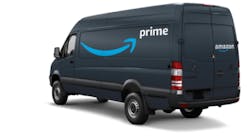In a move that could circumvent the likes of the U.S. Postal Service, UPS and FexEx—and in a way that feels somewhat "Uber-esque"—Amazon is looking to get "hundreds of individuals" across the country set up as owners of small package-delivery companies. They'll be dedicated Amazon logistics providers supplied by a constant stream of the online sales giant's shipments.
And what can't you buy on Amazon.com? The list is likely much smaller than what you can—Amazon already allows individuals or businesses to sell used items or even their own manufactured goods, services, apps, and written works, collecting a percentage on all those sales. Now, Amazon wants to get people set up as lieutenants in its own delivery army.
There's a set formula to get going. Would-be Amazon delivery business owners can buy in for as little as $10,000 in startup costs, according to the company. If hired, they'll spend three weeks in training starting with a week assimilating the company culture at Amazon's headquarters in Seattle and two weeks with established delivery business owners.
That second week is spent shadowing others through the delivery process, and the third includes taking out delivery vans, troubleshooting issues that arise, and taking part in delivery station meetings.
These Amazon Delivery Service Partners (DSP), as the company refers to them, can get deals on Amazon-branded vans (no make or model was specified, but an image in the DSP brochure looks to be a Mercedes-Benz Sprinter). Amazon is also recommending/ endorsing fleet insurance, industrial-grade hand-held devices that drivers would carry, fuel card programs, uniforms, and more. A DSP business, if successfully executed, can expect to run a fleet of 20-40 vans and Amazon "projects" a net an annual profit potential of $75,000 to $300,000, with annual revenue in the $1-4.5 million range.
Although this sounds like a ready-set-go concept, it's actually quite involved. Amazon DSP business owners have to obtain motor carrier authority and set up an account to make payments and undergo a tax interview with Amazon. They'll need to find and hire drivers—no small feat, if you ask any current motor carrier—including running things like background checks, drug tests, and payroll services.
"Build your employee handbook, including determining how you will pay drivers and offer health benefits, and consult with legal and other advisers to finalize your plan," Amazon recommends. The company envisions these delivery business owners essentially as quarterbacks or team captains sending out drivers in the morning and debriefing them at the end of the day as the vans are prepared for their next routes, all optimized by Amazon (or Amazon-endorsed) business and logistics tools.
DSP owners will get a fixed monthly payment from Amazon based on the number of vans they're operating and a payment per package delivered.
Will it work? Possibly, but plenty of experienced businesspeople have tried and failed in the complex logistics business. Amazon is offering its help and support along the way—and seems to be banking that it can "crowdsource" its own last-mile delivery innovation to compete with the usual suspects in doorstep-delivery providers.
But failure is certainly an option. "We do not guarantee results of any kind," Amazon notes in its DSP recruitment brochure, "including that what a delivery company earns will exceed the owner's investment in his or her business."



